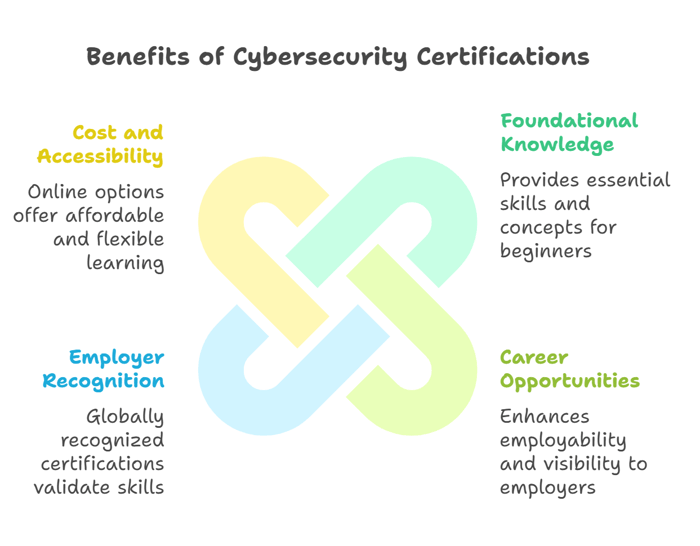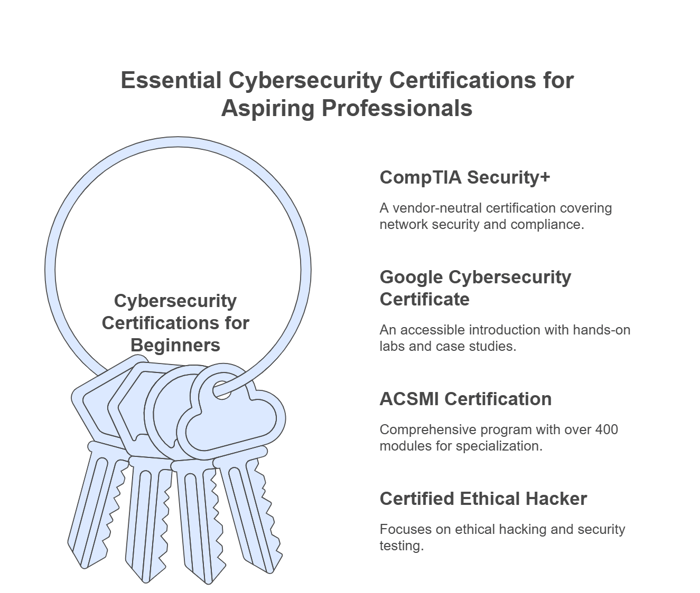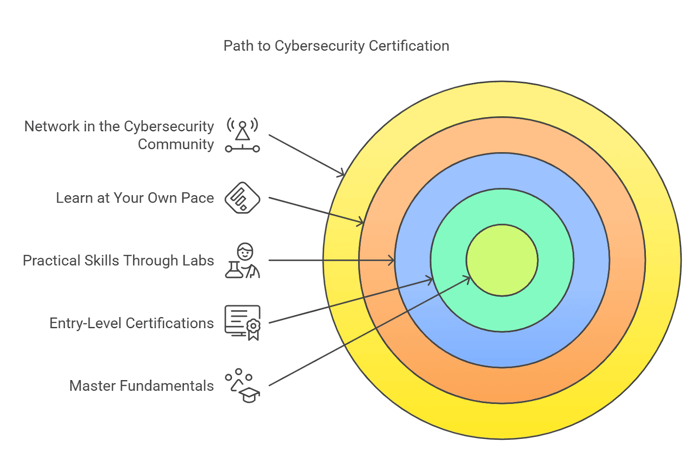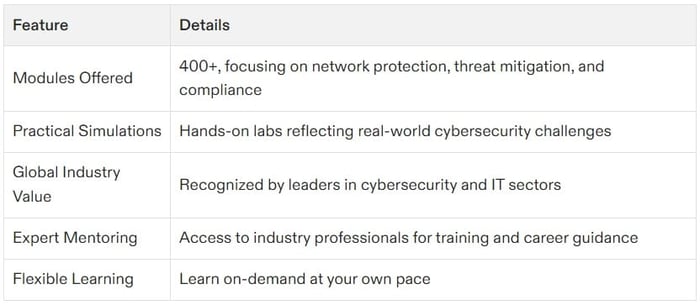Table of Contents
- The Role of Certification in Cybersecurity
- Why Choose a Cybersecurity Certification Without Experience?
- Top Certifications for Beginners
- How to Earn a Cybersecurity Certification Without Experience
- Career Potential with Cybersecurity Certification Without Experience
- Why ACSMI Certification Stands Out
- Wrapping It Up
- Final Thoughts
- FAQs About Cybersecurity Certification Without Experience
Cybersecurity has become one of the most critical fields in today’s digital landscape, with businesses and governments striving to protect their systems from evolving threats. As our dependence on digital infrastructure increases, so does the need for skilled professionals to defend against cyberattacks. Despite the significant demand for cybersecurity professionals, the field remains highly competitive. This has led many aspiring professionals to ask: Is it possible to break into cybersecurity without any prior experience? The good news is yes, and Cybersecurity Certification Course Free options can be the key to unlocking a successful career in this dynamic industry.
The Role of Certification in Cybersecurity
Cybersecurity certifications play a vital role in shaping an individual's career, especially for those without prior professional experience. These certifications offer a structured pathway to build foundational knowledge and prove your competence in the field. For beginners, certifications bridge the knowledge gap by focusing on relevant technical skills and signaling to employers that you’re serious about your career in cybersecurity.
Certifications like CompTIA Security+ and Google’s Cybersecurity Certificate are excellent examples of entry-level certifications. These programs introduce learners to key concepts such as network security, threat management, and risk assessment. Even without hands-on experience, these certifications make it possible to land entry-level roles like Security Analyst, Cybersecurity Technician, or SOC Analyst.
Why Choose a Cybersecurity Certification Without Experience?
Starting a career without experience can be daunting, but cybersecurity certifications offer several benefits that ease the transition into the field. Let’s explore why choosing a cybersecurity certification without experience can be an effective strategy.

1. Foundational Knowledge
Certifications such as CompTIA, Google Cybersecurity, and ACSMI are structured to teach everything a beginner needs to know. They start by introducing basic terminologies and best practices, making it easy for newcomers to grasp fundamental tools and techniques.
2. Career Opportunities
Hiring managers often look for certifications as a proof of skill. Even without professional experience, certifications like ACSMI or Google Cybersecurity Certification serve as validation of your technical ability and help you get noticed by employers.
3. Recognition by Employers
Top certifications such as Google’s Cybersecurity Certificate are recognized globally, giving you an edge when applying for cybersecurity roles in different industries or regions. They can serve as a credible stamp of approval, proving you have the knowledge needed to thrive in a fast-growing field.
4. Cost and Accessibility
Many cybersecurity certifications are now offered online, making them accessible to individuals without tech experience. Programs vary in terms of cost and depth but often include hands-on labs and virtual simulations, providing opportunities to practice real-world skills in a controlled, virtual environment.
Top Certifications for Beginners
If you're looking for a Cybersecurity Certification Philippines without experience, it’s crucial to choose one that fits your learning style, goals, and budget. Below are some top certifications for entry-level cybersecurity enthusiasts:

1. CompTIA Security+
One of the most popular certifications, Security+ is vendor-neutral and covers a wide range of topics. It’s beginner-friendly and focuses on areas such as network security, incident response, and compliance. It’s widely recognized in the industry, making it an excellent starting point for anyone looking to enter the cybersecurity field.
2. Google Cybersecurity Certificate
Google’s Cybersecurity Certificate offers an accessible introduction to the field of cybersecurity. The program includes six modules with hands-on labs and case studies, making it ideal for those new to cybersecurity. It provides foundational knowledge in areas like network security, data protection, and risk management.
3. ACSMI Certification
For those seeking a more comprehensive certification, ACSMI offers a program with over 400 modules. The ACSMI certification covers everything from entry-level concepts to advanced topics such as ethical hacking, cloud security, and penetration testing. It’s perfect for individuals who plan to specialize in specific areas of cybersecurity.
4. Certified Ethical Hacker (CEH)
While CEH is slightly more advanced, it’s an excellent option for individuals interested in ethical hacking and security testing. The program equips professionals with knowledge on testing and securing networks, detecting vulnerabilities, and preventing breaches.
How to Earn a Cybersecurity Certification Without Experience
Embarking on your cybersecurity journey without experience requires careful planning and dedication. Here’s how you can get started with a cybersecurity certification without experience:

1. Start with Entry-Level Certifications
Choose a beginner-friendly program like Google Cybersecurity Certification or CompTIA Security+. These certifications provide a solid foundation in cybersecurity, helping you understand the basics of the field.
2. Learn at Your Own Pace
Many certifications offer flexible, self-paced learning options. Look for programs that allow you to study at your own convenience. This flexibility makes it easier to balance your studies with other responsibilities.
3. Gain Practical Skills Through Labs
Hands-on labs are critical for developing real-world cybersecurity skills. Many certifications, including ACSMI, offer virtual labs where you can practice everything from threat detection to incident response in a controlled environment.
4. Network in the Cybersecurity Community
Mentorship and community discussions can significantly boost your confidence as a beginner. Participate in online forums and communities, such as Reddit’s r/cybersecurity, to learn from others and get advice on navigating the field.
5. Master the Fundamentals Before Specializing
Before diving into specialized fields like penetration testing or malware analysis, start with the basics. Building a strong foundation in general cybersecurity will make it easier to tackle advanced topics later on.
Career Potential with Cybersecurity Certification Without Experience
Cybersecurity certifications without experience can open doors to a wide range of job opportunities. Entry-level roles such as Security Analyst, Junior SOC Analyst, IT Security Specialist, and Cybersecurity Consultant are all accessible with certification alone. Employers value skills over titles, and certifications provide undeniable proof of your competencies, even without hands-on job experience.
On average, entry-level professionals in cybersecurity earn a starting salary of $60,000 to $80,000 annually. This figure can increase significantly with skill specialization and additional certifications.
Why ACSMI Certification Stands Out
The ACSMI Certification is particularly advantageous for individuals without experience due to its tailored learning approach. Featuring over 400 modules, it offers an unparalleled depth of content that grows alongside your career needs. From beginner-level explanations to advanced concepts, the ACSMI program adapts to your skill level and provides the tools needed for excellence in cybersecurity.
Wrapping It Up
A cybersecurity certification without experience is your gateway to a rewarding career in one of the world’s fastest-growing industries. By choosing an entry-level program, you gain foundational knowledge, hands-on skills, and the confidence to compete in the job market. For those seeking an all-encompassing learning path, ACSMI’s 400+ modules certification goes far beyond entry-level knowledge. Whether you’re just starting out or aiming to specialize later, there’s a certification designed to meet your needs.
Final Thoughts
Breaking into cybersecurity may seem challenging, but earning a cybersecurity certification without experience can be the game-changer you need. Certifications provide a clear and accessible path for beginners to understand the fundamentals, gain hands-on skills, and showcase their readiness to employers. Programs like Google’s Cybersecurity Certificate offer an excellent starting point, with structured learning ideal for newcomers.
For those aiming to go beyond the basics and build a robust, future-proof career, certifications such as ACSMI’s 400+ modules program are a standout choice. They offer unparalleled depth and specialization, catering to evolving industry demands while remaining accessible to those without prior experience.
FAQs About Cybersecurity Certification Without Experience
1. Can I get into cybersecurity with no prior IT experience?
Yes! Certifications like Google Cybersecurity Certification and ACSMI’s 400+ module program can help you learn the basics and gain recognition in the field, even without prior experience.
2. How long does it take to earn a cybersecurity certification without experience?
It depends on the program, but most beginner certifications take 3–6 months to complete with consistent effort.
3. Which certification is best for beginners?
CompTIA Security+, Google Cybersecurity Certificate, and ACSMI Certification are excellent options for beginners. These certifications provide a strong foundation for a career in cybersecurity.
4. Can a certification replace a degree?
While certifications are highly respected, having a degree may enhance long-term career prospects. However, many roles prioritize skills over formal education, especially in the cybersecurity field.
5. What is the cost of a cybersecurity certification without experience?
Beginner certifications range from $39 per month (like Google Cybersecurity) to $599+ for comprehensive programs like ACSMI.





